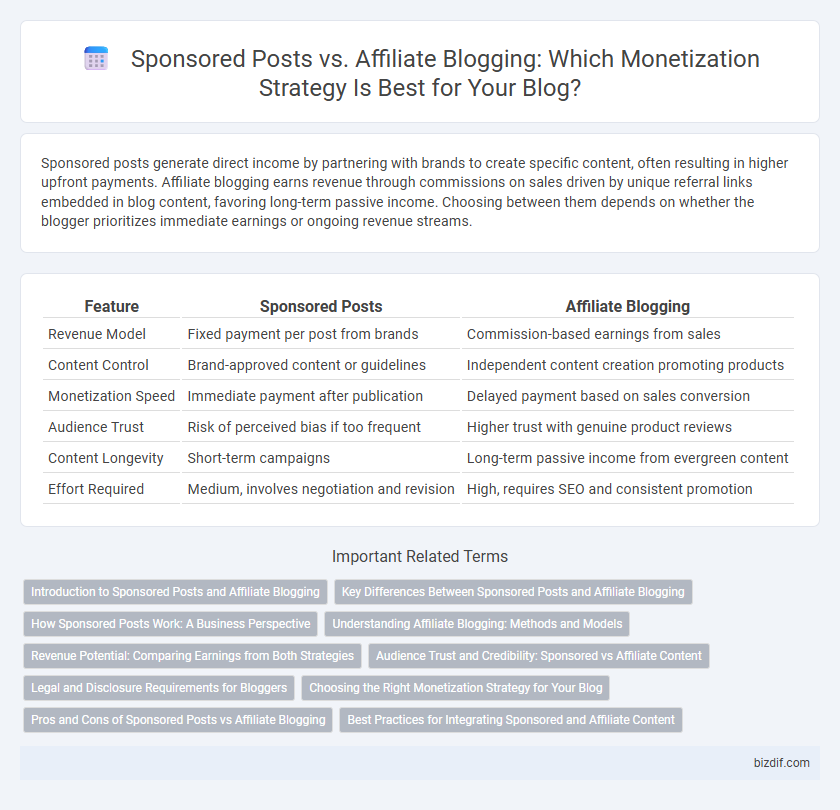Sponsored posts generate direct income by partnering with brands to create specific content, often resulting in higher upfront payments. Affiliate blogging earns revenue through commissions on sales driven by unique referral links embedded in blog content, favoring long-term passive income. Choosing between them depends on whether the blogger prioritizes immediate earnings or ongoing revenue streams.
Table of Comparison
| Feature | Sponsored Posts | Affiliate Blogging |
|---|---|---|
| Revenue Model | Fixed payment per post from brands | Commission-based earnings from sales |
| Content Control | Brand-approved content or guidelines | Independent content creation promoting products |
| Monetization Speed | Immediate payment after publication | Delayed payment based on sales conversion |
| Audience Trust | Risk of perceived bias if too frequent | Higher trust with genuine product reviews |
| Content Longevity | Short-term campaigns | Long-term passive income from evergreen content |
| Effort Required | Medium, involves negotiation and revision | High, requires SEO and consistent promotion |
Introduction to Sponsored Posts and Affiliate Blogging
Sponsored posts involve brands paying bloggers to create content that promotes their products or services directly, ensuring clear disclosure to maintain transparency and trust with the audience. Affiliate blogging centers on bloggers earning commissions by recommending products through unique affiliate links, driving sales without upfront payment from brands. Understanding these models helps bloggers choose strategies aligned with their content goals and monetization preferences.
Key Differences Between Sponsored Posts and Affiliate Blogging
Sponsored posts involve a fixed payment from brands in exchange for content promoting their products or services, while affiliate blogging earns commissions based on sales generated through unique affiliate links embedded in blog posts. Sponsored posts provide predictable income regardless of audience action, whereas affiliate blogging income fluctuates with the blog's conversion rate and traffic quality. Key differences include payment structure, content control, and performance dependency, impacting how bloggers strategize monetization.
How Sponsored Posts Work: A Business Perspective
Sponsored posts involve businesses paying bloggers directly to create content that promotes their products or services, ensuring brand visibility and targeted audience engagement. Companies typically negotiate terms such as post placement, content guidelines, and performance metrics to maximize return on investment. This strategic collaboration leverages the blogger's influence to drive consumer awareness and enhance marketing campaigns effectively.
Understanding Affiliate Blogging: Methods and Models
Affiliate blogging primarily involves promoting products or services through unique affiliate links embedded in content, earning commissions per sale, lead, or click generated. Common methods include product reviews, comparison posts, and tutorial-based content that provide value while driving conversions. Popular affiliate models encompass pay-per-sale (PPS), pay-per-click (PPC), and pay-per-lead (PPL), allowing bloggers to tailor strategies aligned with audience behavior and niche demands.
Revenue Potential: Comparing Earnings from Both Strategies
Sponsored posts typically yield a fixed payment or negotiated fee per post, providing predictable income for bloggers with established audiences. Affiliate blogging offers variable earnings through commission percentages on sales generated, often resulting in higher long-term revenue if promoted products align closely with the blog's niche. Combining both strategies can maximize revenue potential by balancing steady sponsorship fees with scalable affiliate commissions.
Audience Trust and Credibility: Sponsored vs Affiliate Content
Sponsored posts often face skepticism from audiences due to perceived bias, as brands directly pay for specific content, potentially undermining trust and credibility. Affiliate blogging tends to foster higher audience trust since recommendations are based on genuine experiences and performance-linked earnings, aligning blogger interests with reader satisfaction. Maintaining transparency and honest disclosure in both methods is crucial to preserving credibility and long-term audience loyalty.
Legal and Disclosure Requirements for Bloggers
Sponsored posts require clear and conspicuous disclosure to comply with FTC guidelines, ensuring readers are aware of paid partnerships. Affiliate blogging mandates transparent identification of affiliate links to maintain trust and avoid deceptive advertising claims. Both strategies must adhere to federal and state regulations to prevent legal penalties and protect blogger credibility.
Choosing the Right Monetization Strategy for Your Blog
Sponsored posts offer direct partnerships with brands, providing guaranteed payment per post and greater creative control over content alignment with your blog's niche. Affiliate blogging generates income through commission-based sales by promoting products or services, requiring strong audience trust and effective call-to-actions to maximize conversions. Selecting the right monetization strategy depends on your blog's target audience, content style, and long-term revenue goals to ensure sustainable growth and profitability.
Pros and Cons of Sponsored Posts vs Affiliate Blogging
Sponsored posts offer guaranteed income through fixed fees, providing predictable revenue for bloggers, but they may limit content authenticity and audience trust. Affiliate blogging generates passive income based on performance, incentivizing authentic product promotion, though earnings can be inconsistent and depend heavily on traffic and conversion rates. Balancing these methods requires evaluating monetization goals, audience preferences, and long-term brand credibility.
Best Practices for Integrating Sponsored and Affiliate Content
Integrate sponsored posts and affiliate blogging by clearly disclosing partnerships to maintain transparency and trust with your audience. Use tailored content that naturally incorporates products or services, enhancing relevance and engagement without undermining editorial integrity. Optimize SEO by strategically placing keywords and links while balancing promotional content with valuable, informative posts to sustain reader interest and boost conversions.
Sponsored posts vs Affiliate blogging Infographic

 bizdif.com
bizdif.com